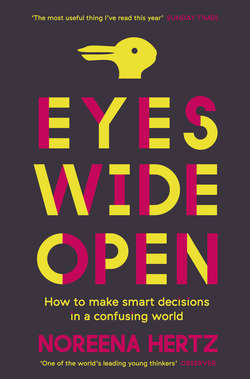Читать книгу Eyes Wide Open: How to Make Smart Decisions in a Confusing World - Noreena Hertz - Страница 24
The Truth about Harry
ОглавлениеBeing stuck in the past can cause other problems too – a fog of assumptions based on past experiences can obscure the new or the innovative.
This is something that a dozen of the most prestigious British and American publishing houses must now realise.55
When a 223-page manuscript of around 90,000 words from an unknown female author landed on their desks back in 1996 they quickly turned it down for a number of understandable but misconceived reasons. The book was too long for kids these days – 50,000 words longer than the average children’s novel at the time.56 Reading by boys was declining, especially of books by women and those light on dialogue. Moreover, this was a straight-on, full-blown fantasy, not a book about the kinds of serious issues such as bullying or broken families that were currently in vogue. It was hard to think of a successful children’s fantasy book in recent times.
Penguin, one of Britain’s most prestigious publishers, flatly rejected the manuscript. At Transworld it languished in the in-tray of somebody who was off sick.57 Indeed, twelve of the top British and American publishers turned it down.58
It took a publisher new to the game, working in a children’s division just a couple of years old, with no past to be stuck in and a belief that a story with emotional resonance would always find an audience, to take the plunge.
Barry Cunningham, a former marketing man and one-time giant puffin (at exhibitions for Penguin’s children’s books imprint, Puffin, Barry, as Marketing Director, would walk around thus costumed), read all 223 pages. ‘The skies didn’t part and lightning didn’t come down or anything,’ he recounted as we sat in the basement of the nineteenth-century Savile Club, the Mayfair haunt previously frequented by Kipling, Hardy, Yeats and other literary greats, me sipping tea, he his trademark Coca-Cola.
Cunningham simply thought that the manuscript was ‘really engaging’. He negotiated with the author’s agent ‘for about five minutes, because he didn’t want very much money and I didn’t have very much money’, and bought the first two books in the series for the princely sum of £2,000.
As he said to me, ‘The rest is history.’ And it sure was.
The author, a first-time writer by the name of Joanna Rowling, who was ‘so nervous’ the first time Barry spoke to her that she ‘couldn’t really talk’, was delighted to get the firm offer, especially after so many rejections. And Barry Cunningham, of course, was also delighted. The seven Harry Potter books went on to sell over 450 million copies worldwide, have been translated into more than seventy languages, and spawned a movie franchise worth over $4.5 billion.
Rudyard Kipling was right to caution us to treat both triumph and disaster as ‘imposters’. Yet we’re all too prone to letting failure and success become our only guiding beacons. What this means is that not only do we risk ignoring cues that things may be changing around us, but also deny ourselves the possibility of contemplating futures, trajectories and possibilities that are different from what has come before.
